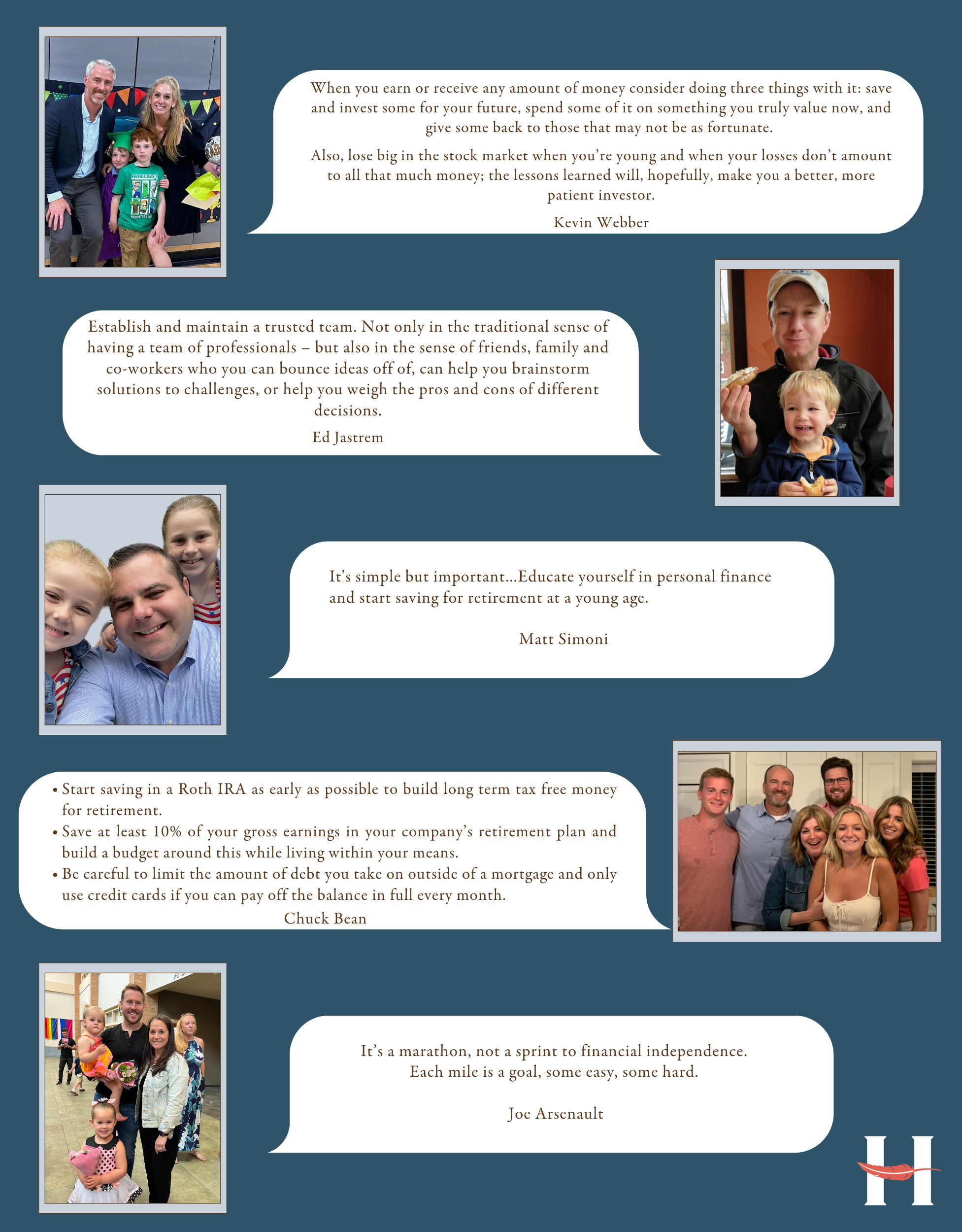In honor of Father’s Day, we are sharing some valuable financial lessons from famous (and famous in our eyes at Heritage) dads.
Make Your Money Work for You
Robert Kiyosaki, the author of Rich Dad, Poor Dad, is arguably everyone’s father figure because of how much wisdom he shares with his readers. He explains the important lesson that rich people stay rich by making their money work for them, while broke people stay broke by spending all their money, and middle-class people stay middle class by saving all of their money.
There are many ways you can have your money work for you, including investing in stocks, bonds, real estate, and businesses. This lesson touches on the importance of investing your money wisely and making money while you sleep—or as you’re going about your daily life.
Teach Yourself Financial Literacy
We are including one more lesson from father figure Kiyosaki. In his book, he also coined the popular quote, “money without financial literacy is no money.” You could make millions of dollars, but if you don’t have good money habits, you’ll quickly spend it all away. As Kiyosaki explains, “Making money and keeping money are two separate things.”
Stick to a Budget
Ariana Rockefeller likely learned countless financial lessons as a child, but the one that stuck with her was to keep track of every dollar she spent. She learned this from her father and great-great-grandfather, John D. Rockefeller, Sr., who wrote down everything he spent in a ledger. She was given her first ledger by her father, and she began tracking her input and output from her allowance money. To this day, she still maintains the same habit, although now her budget is kept electronically.(1)
This is an important lesson in knowing how much money is coming in and how much money is coming out, as well as how to stick to a budget.
Focus on the Long-Term Strategy
Warren Buffet is known for his many pieces of financial wisdom. As one of the world’s most successful investors, we have to include him in our list of famous financial fathers. There are so many lessons to choose from, but one of his best lessons is to focus on the long-term game. He famously said, “Someone is sitting in the shade today because someone planted a tree a long time ago.”(2)
This is a good illustration of the long-term goal of financial planning. Planting and nurturing the seeds of financial success today can lead to shade to enjoy later in life. By having a multi-decade horizon, you can work with your advisor to create a long-term plan based on your goals.
Don’t Follow the Crowd
The apple doesn’t fall far from the Simons tree when it comes to being an intelligent investor. Jim Simons is a billionaire hedge fund manager and philanthropist. He is also the founder of Renaissance Technologies, a quantitative hedge fund based in New York. Jim has five children, including his son Nat Simons, who is also an American billionaire hedge fund manager and philanthropist and the founder of Meritage Group, an investment management firm managing over $12 billion in assets.(3,4)
Nat and his siblings undoubtedly received a lot of great financial advice from their father. As a mathematician, Jim has always been interested in pattern recognition and quantitative models (he is known as the “Quant King”). Because of this, his most resounding financial advice is to not follow the crowd. Avoid the emotional rollercoaster and instead use mathematical and statistical modeling, measurement, and research to understand behavior (the basis behind quantitative analysis).(5)
Learn more about Jim Simons by listening to our Wealthy Behavior podcast episode, The Man Who Solved the Market.
Save Like a Pessimist, Invest Like an Optimist
We couldn’t have an article about famous dads without including the world’s most famous tech pioneer, Bill Gates. Bill and Melinda French Gates have three children, and they have shared financial and life lessons with their children throughout their lives.
The famous inventor and businessman has shared many pieces of great advice over his career, but one that he continues to echo is, “Save like a pessimist, invest like an optimist.” Put another way, Gates believes that you can be an optimist in the long run only if you’re pessimistic enough to survive the short run. For example, since the day he started Microsoft, he always insisted on having enough cash in the bank to keep the company alive for 12 months with no revenue coming in, and he has always been careful about growing the company too quickly.
Statistics show us that things are bound to go wrong, but in the long term, the market generally shifts toward progress, despite frequent setbacks. Gates understood that if he had his immediate bases covered, he could then think of long-term growth.(6)
Last but definitely not least, some fathers at Heritage share some great advice
- https://www.investing.com/news/stock-market-news/father-figures-dads-best-financial-advice-1897764
- https://www.uschamber.com/co/start/strategy/warren-buffett-quotes-for-businesses
- https://www.investopedia.com/articles/investing/030516/jim-simons-success-story-net-worth-education-top-quotes.asp
- https://www.crunchbase.com/person/nat-simons
- https://tradersunion.com/interesting-articles/richest-forex-traders-trading-secrets-life-stories/jim-simons-trading-strategy/
- https://www.cnbc.com/2021/01/04/bill-gates-powerful-lesson-invest-money-like-an-optimist-save-like-a-pessimist.html



